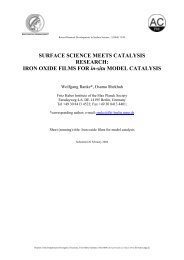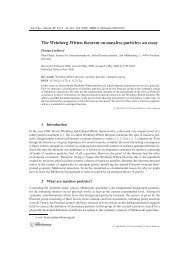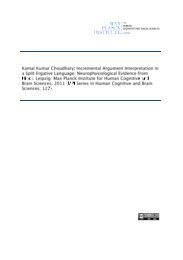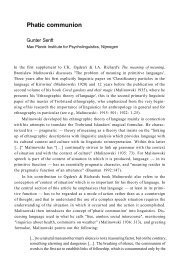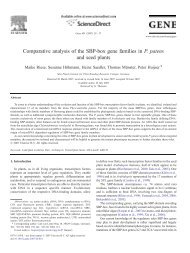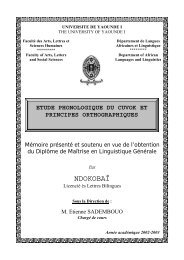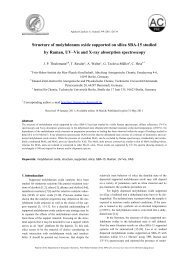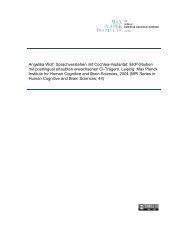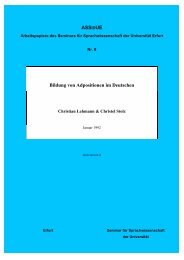Neural Correlates of Processing Syntax in Music and ... - PubMan
Neural Correlates of Processing Syntax in Music and ... - PubMan
Neural Correlates of Processing Syntax in Music and ... - PubMan
You also want an ePaper? Increase the reach of your titles
YUMPU automatically turns print PDFs into web optimized ePapers that Google loves.
<strong>Music</strong>al Tra<strong>in</strong><strong>in</strong>g 25<br />
Deliberate practise is a highly structured activity with the explicit goal to improve ones<br />
own performance. This activity requires effort <strong>and</strong> is not <strong>in</strong>herently enjoyable, but <strong>in</strong>dividuals<br />
might be motivated by its <strong>in</strong>strumental value <strong>in</strong> improv<strong>in</strong>g performance. It <strong>in</strong>volves<br />
careful monitor<strong>in</strong>g <strong>and</strong> problem solv<strong>in</strong>g to atta<strong>in</strong> the desired improvements.<br />
Repeated exposure to critical aspects <strong>of</strong> the task should allow for an <strong>in</strong>crementally improvement<br />
<strong>of</strong> the own performance <strong>in</strong> response to feedback (Gruson, 1988; Miklaszewski,<br />
1989).<br />
Ericsson, Krampe, <strong>and</strong> Tesch-Römer (1993) proposed a framework to account for expert<br />
performance. Their central thesis is that expert performance is related to an extended<br />
process <strong>of</strong> skill acquisition, mediated by large, but not excessive daily amounts<br />
<strong>of</strong> deliberate practice (to guarantee for optimal concentration <strong>and</strong> effectiveness). They<br />
observed a highly predictive relationship between the skill level <strong>of</strong> different groups <strong>of</strong><br />
musicians (excellent musicians with potential for <strong>in</strong>ternational careers, good musicians,<br />
<strong>and</strong> music teachers) <strong>and</strong> the average number <strong>of</strong> hours <strong>of</strong> accumulated practise. Moreover,<br />
they did show that excellent <strong>and</strong> good musicians did not differ <strong>in</strong> terms <strong>of</strong> their<br />
actual amount <strong>of</strong> practis<strong>in</strong>g, but <strong>in</strong> the accumulated amount <strong>of</strong> practis<strong>in</strong>g over the entire<br />
developmental period. However, <strong>in</strong> the early stages <strong>of</strong> acquir<strong>in</strong>g musical expertise (i.e.,<br />
<strong>in</strong> 7 to 9 year old children), conceptions based on the amount <strong>of</strong> practice may be <strong>in</strong>adequate<br />
to underst<strong>and</strong> the process <strong>of</strong> <strong>in</strong>strumental development. Instead, their (metacognitive)<br />
strategies (as, e.g., the amount <strong>of</strong> self-correction when rehears<strong>in</strong>g, or beg<strong>in</strong>n<strong>in</strong>g<br />
with repertoire to be practised before turn<strong>in</strong>g to pieces they enjoy to play) were a<br />
more powerful predictor than their accumulated practice (McPherson, 2005): Better<br />
players had more sophisticated learn<strong>in</strong>g strategies (very early <strong>in</strong> their development), <strong>and</strong><br />
the general underst<strong>and</strong><strong>in</strong>g that their performance was tied to the quality <strong>of</strong> their effort.<br />
<strong>Music</strong>al skills<br />
In general, experts atta<strong>in</strong> particular skills that circumvent basic limits on work<strong>in</strong>g memory<br />
capacity <strong>and</strong> sequential process<strong>in</strong>g. Experts do not only have more, but also better<br />
organized knowledge, which enables them to retrieve solution plans as part <strong>of</strong> their<br />
comprehension <strong>of</strong> problems. This is a result <strong>of</strong> acquir<strong>in</strong>g – dur<strong>in</strong>g many years <strong>of</strong> experience<br />
– vast amounts <strong>of</strong> knowledge <strong>and</strong> the ability to perform pattern-based retrieval.<br />
<strong>Music</strong>ians have sophisticated skills for basic aspects <strong>of</strong> auditory process<strong>in</strong>g, e.g., they<br />
effortlessly detected tempo manipulations (Ellis, 1991), changes <strong>in</strong> the tun<strong>in</strong>g <strong>of</strong> <strong>in</strong>tervals<br />
(Elliot, Platt, & Rac<strong>in</strong>e, 1987), or <strong>in</strong> <strong>in</strong>strumental timbre (Chartr<strong>and</strong> & Bel<strong>in</strong>, 2006;<br />
Crummer, Walton, Wayman, Hantz, & Fris<strong>in</strong>a, 1994). In addition, employ<strong>in</strong>g their<br />
knowledge <strong>of</strong> musical structure, musicians are superior [1] <strong>in</strong> their process<strong>in</strong>g <strong>of</strong> consonant<br />
vs. dissonant target chords follow<strong>in</strong>g harmonic prim<strong>in</strong>g (Big<strong>and</strong> et al., 1999), [2] <strong>in</strong>



